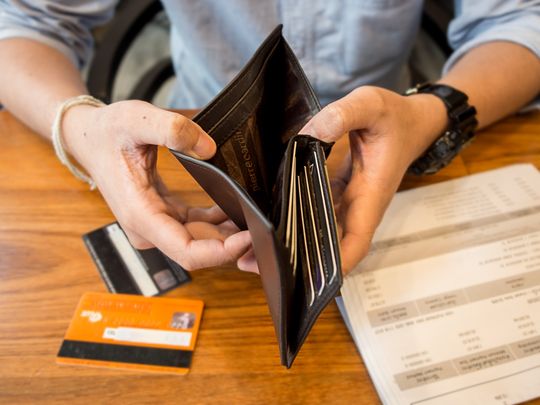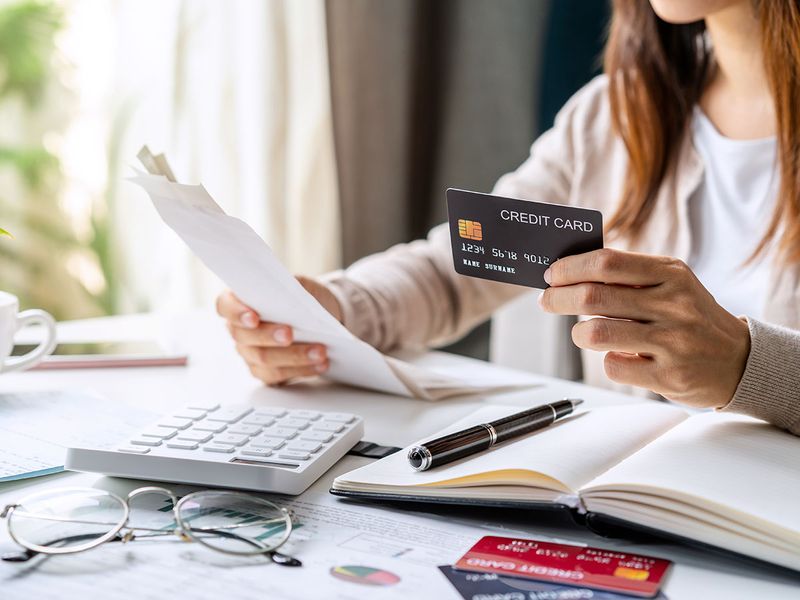
Dubai: When times are tough and purse strings tighten, credit card debt may be inevitable if you're learning to manage credit or are forced to make risky financial decisions due to hardships.
Dubai-based businesswoman Amrutha Shanawas, 51, was used to using three credit cards for most of her purchases and utility bills payments. But the loss of both her parents, just a year apart of each other, not only got her dependent on credit cards even more, but it plunged her finances into a state of crisis.
“I resorted to my credit cards to facilitate my cash flow and fund some of the expenses that came up when at home in India for the funeral-related ceremonies. But before I could finish paying-off the debts I took on then, interest-related costs piled up,” she shared, which amounted to Dh37,000.
“It took me a little over a year to bounce back and get my credit levels healthy again. I took the advise of my financial planner and took a loan consolidating all my debts and closed my credit heavy cards. I paid back the loan and now use my credit card for expenses judiciously.”
It may be a good time to consolidate your debt if you have months or years to go before your debt is paid off. It's worthwhile to consolidate when you still have many payments remaining because then you can reap the benefits through a lower payment and a better interest rate.
Not the only debt dilemma
Similarly, for Abu Dhabi-based corporate lawyer Eliza Tom, 30, a similar debt-riddled predicament arose when her husband Ronny lost his job. For the next year or so, they found themselves heavily reliant on their credit cards to get by and accumulated over Dh23,000 in debt.
"We got our debt paid off in 2023 after we decided to live a strict no-credit card lifestyle for little over a year," said Tom, who documents her journey on her blog. "We didn’t want to rack up high-interest debt, so we have been very strategic and intentional with how we use our credit card ever since."
A parallel that can be drawn from both of their instances is they had a plan – albeit different approaches – to get out of debt, which is why Essam Kabeelali, an Abu Dhabi-based credit advisor, reiterated an advice that he often gives those burdened by high-interest debt and living within their means.
“Having a plan can help you avoid debt or keep it manageable when money is tight. If your circumstances allow it, consider alternatives before making credit card mistakes that make it difficult to bounce back,” he said, before listing out a few such possible mistakes.
Lesson #1: Don’t spend as usual after cash-crunch circumstances
Change your budget if any cash-crunch circumstances are jeopardising it. Both Shanawas and Tom agreed that they, too, had to frequently adjust her family budget to include the varying charges of fuel, and internet and cell phone bills on her credit card.
To balance fluctuations in costs, Tom scaled back in other areas and opted for alternatives. The family now dines out and travels less, and the kids are attending a less expensive arts camp. “Look at the budget and take a hard look at those needs versus wants,” Kabeelali added.
“As you're reviewing your credit card statement, consider cutting out unnecessary purchases or unused subscriptions. Prioritise rent, utilities, food and expenses that help bring in income. If you're still stretched financially after making changes, choose between cutting expenses and bringing in income.”

Lesson #2: Use your credit card limits to your advantage not as traps
Trimming your budget may offer opportunities to save that prevent you from relying on credit cards, advised Shanawas. “Save what you can - even just around Dh20 per week. I feel a fund is foolproof as a credit limit can eventually max out or get slashed at the issuer's discretion,” she added.
“Before that happens, you could also try requesting a higher credit limit from issuers when accounts are in good standing. This is what my debt advisor advised me. This way, I had some credit available as a last-resort option that supplements an emergency fund.”
Note, an issuer may run a 'hard inquiry' on your credit after making this request, an action that can temporarily drop credit scores. (When a lender requests to review your credit reports after you've applied for credit, it results in a ‘hard inquiry’, which usually impact credit scores.)
Lesson #3: Never carry a balance on high-interest credit card post-crunch
Tom regrets carrying a large balance on a high-interest credit card that made her purchases more expensive. For credit card account interests assessed since 2021, the average rate was 16.5 per cent, according to multiple global statistics. Some credit card interest rates run even higher at 29.99 per cent.
“While a card's interest rate depends on economic factors and your credit, some cards or institutions offer lower rates that may save money on ongoing balances,” said Parthiv Patnaik, another Abu Dhabi-based debt advisor.
“If you need a debt payoff strategy, a good credit score [of 690 or higher] may qualify you for a balance transfer credit card that allows you to move a high-interest balance onto a new card at a lower rate. Weigh the cost of the balance transfer and the ongoing interest charges to choose the best option.”
Patnaik further noted that the ideal balance transfer card has no annual fee, a low balance transfer fee of 3 per cent or less, and a long enough zero per cent introductory interest rate period to make progress on debt.
While a card's interest rate depends on economic factors and your credit, some cards or institutions offer lower rates that may save money on ongoing balances
Lesson #4: Abstain from having to take cash advances on their credit card
Another credit card mistake that both Tom and Shanawas regretfully remember making, and both advisors Patnaik and Kabeelali unanimously advise against is, slipping up and taking cash advances on their card when on a tight budget.
“Think twice about cash advances. A credit card cash advance conveniently provides a short-term cash loan at a bank or ATM, but it's costly. The interest on the amount of cash borrowed starts accruing immediately and fees may apply,” added Patnaik.
“Instead, consider a personal loan or targeted offers from issuers that turn available credit on a credit card into a less pricey installment loan that puts cash in your bank account. For the latter option, there's no loan application or credit check required.”
Bottom-line: Crunched for cash? Avoid late payments, fees by planning ahead
• Being on a cash crunch is a good time to use your emergency fund, as this will avoid the fees and interest associated with a cash advance. Be sure to replenish it after tapping into it.
• Even though you may incur late fees, late payments generally won't end up on your credit reports for at least 30 days after the date you miss the payment, knowing this will make it easier to plan your payments as and when cash flow comes in.
• If you foresee a late payment, contact your credit card issuer quickly. A late fee can cost up to Dh100 the first time and up to Dh150 after, according to a 2023 statistic.
• Some issuers may be able to change your due date, refer you to a credit counseling agency that provides a debt management plan, according to Patnaik. These programs may waive fees or lower interest rates for a certain time frame.










